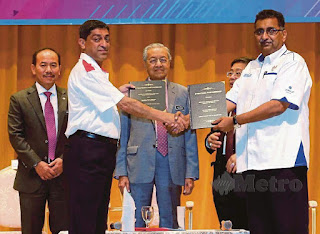Malaysia Reserve
28/3/2019
The Congress of Unions of Employees in the Public and Civil Services Malaysia (Cuepacs) is ready to engage with the government on any revision of the pension scheme for civil servants, as proposed by the government in the Dewan Rakyat yesterday.
Cuepacs president Datuk Azih Muda said the motion can only materialise once all the relevant parties are involved in the discussions and negotiation process.
“The negotiations should include Cuepacs to ensure harmony among the employees, employers and government.
“So far, we are not in the loop, but if we could maintain a good cooperation, the outcome would definitely be the best for all,” he told The Malaysian Reserve in a phone interview yesterday.
Azih was responding to a statement by Deputy Minister in the Prime Minister’s (PM) Department (National Unity and Integration) Datuk Dr Mohamed Farid Md Rafik in the Dewan Rakyat yesterday that the government is considering a change in pension scheme for civil servants employed in the future.
Mohamed Farid said the federal administration is currently assessing the present retirement scheme as part of efforts to cut down expenditure on the civil service, which has nearly tripled in the last two decades.
However, he said the changes will not affect existing civil servants and pensioners.
“Many policies have been improved to ensure the pension benefits to the civil service is always adequate in respect to Article 147 of the Federal Constitution, namely securing the rights of pensioners.
“For the existing civil servants and pensioners, the current pension scheme will be retained. However, for civil servants employed in the future,
the government is studying a renewal of civil service comprehensively, including the post-service aspects,” Mohamed Farid said.
He was responding to a question by MP Datuk Dr Shamsul Anuar Nasarah (Barisan Nasional-Lenggong) who asked whether the government will restructure the civil service to control the size of the government workforce, in line with its new policy of downsizing the civil service.
Azih said Cuepacs had brought up the matter recently, including to PM Tun Dr Mahathir Mohamad, who agreed that a negotiation should be brought to the table, and “not end up in a road protest”.
However, Azih claimed that no party, including the PM’s Department and Public Service Department, had followed up on the union’s motion since. Dr Mahathir previously said the civil service, which now stands at 1.7 million employees compared to one million in 2003, is a drain on the government’s coffers.
“The size of the civil service has grown too big and become worrisome for a very long time as it increases the government’s financial burden and at the same time, reduces allocation for development purposes,” Dr Mahathir said in Parliament recently.
It was reported that government expenditure on salaries alone grew from RM22 billion to RM74 billion between 2003 and 2016. Similarly, spending on civil servant pensions had also increased over the same period.
On increments for civil servants, Mohamed Farid said the government will only consider the move when the sector is proven to be more productive.
“The combination of downsizing civil service and increasing productivity is expected to generate more income to the nation, and when that happens, the government is ready to consider increments for the civil service,” he said.
The 1.7 million civil servants in the country comprise those employed by the federal and state governments, as well as in statutory bodies and local governments.
Mohamed Farid said other efforts to downsize the civil service will include addressing overlapping functions between government departments and agencies, rationalising existing positions, optimising human resource, outsourcing and privatisation.
“The government will ensure the best talents and high-potential officers will be given the appropriate positions, thus improving public trust towards the civil service,” he added.





